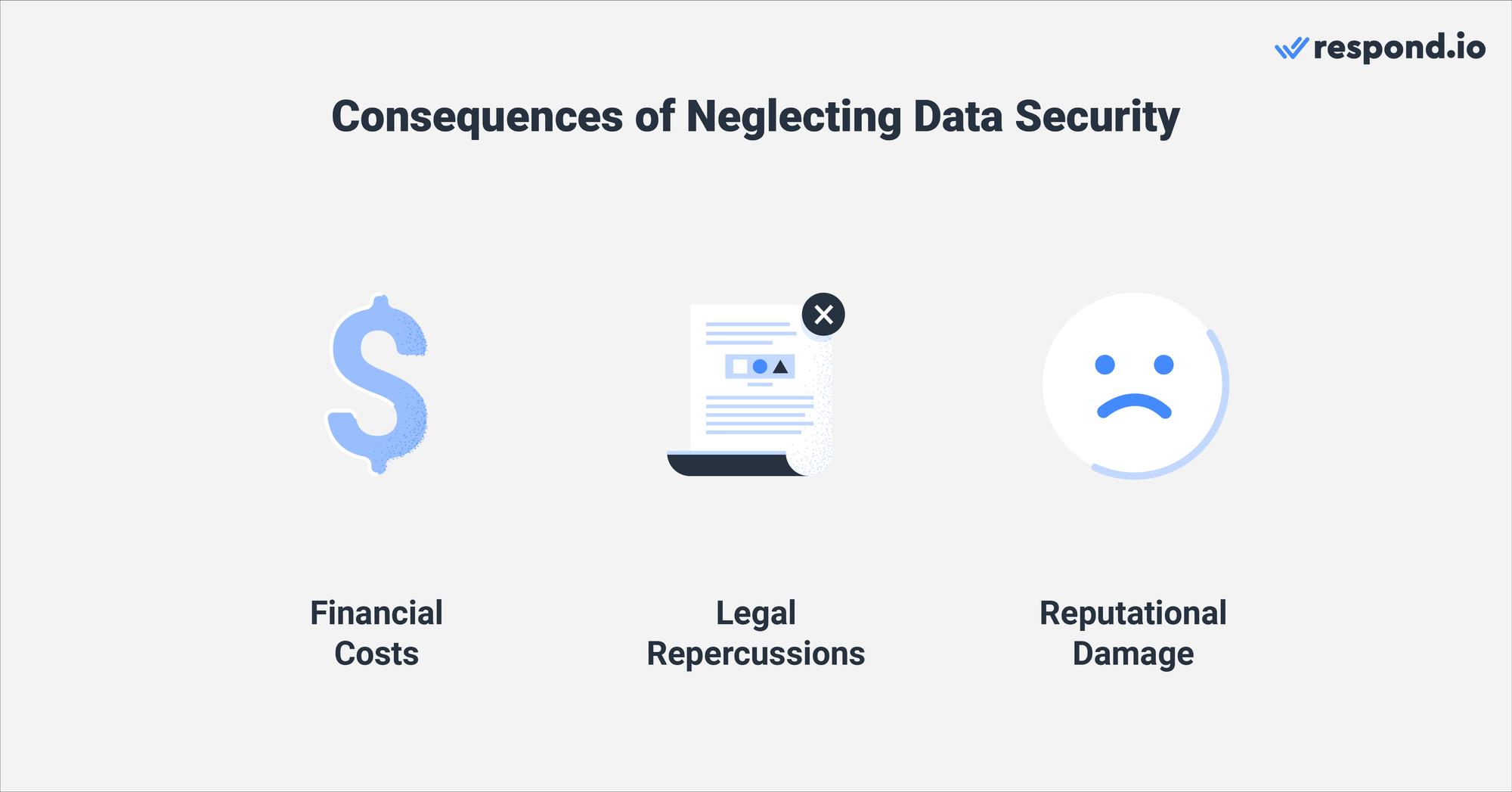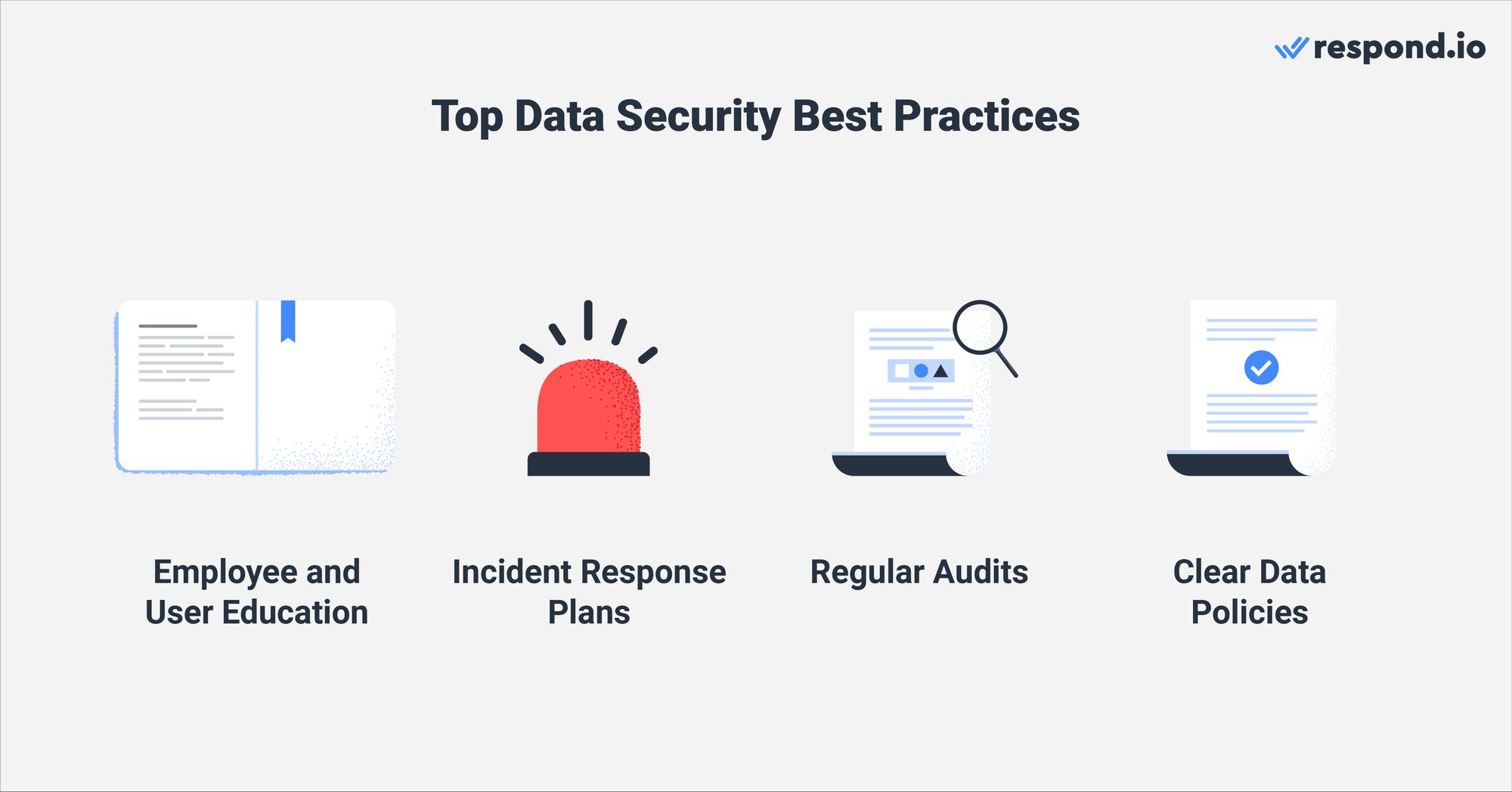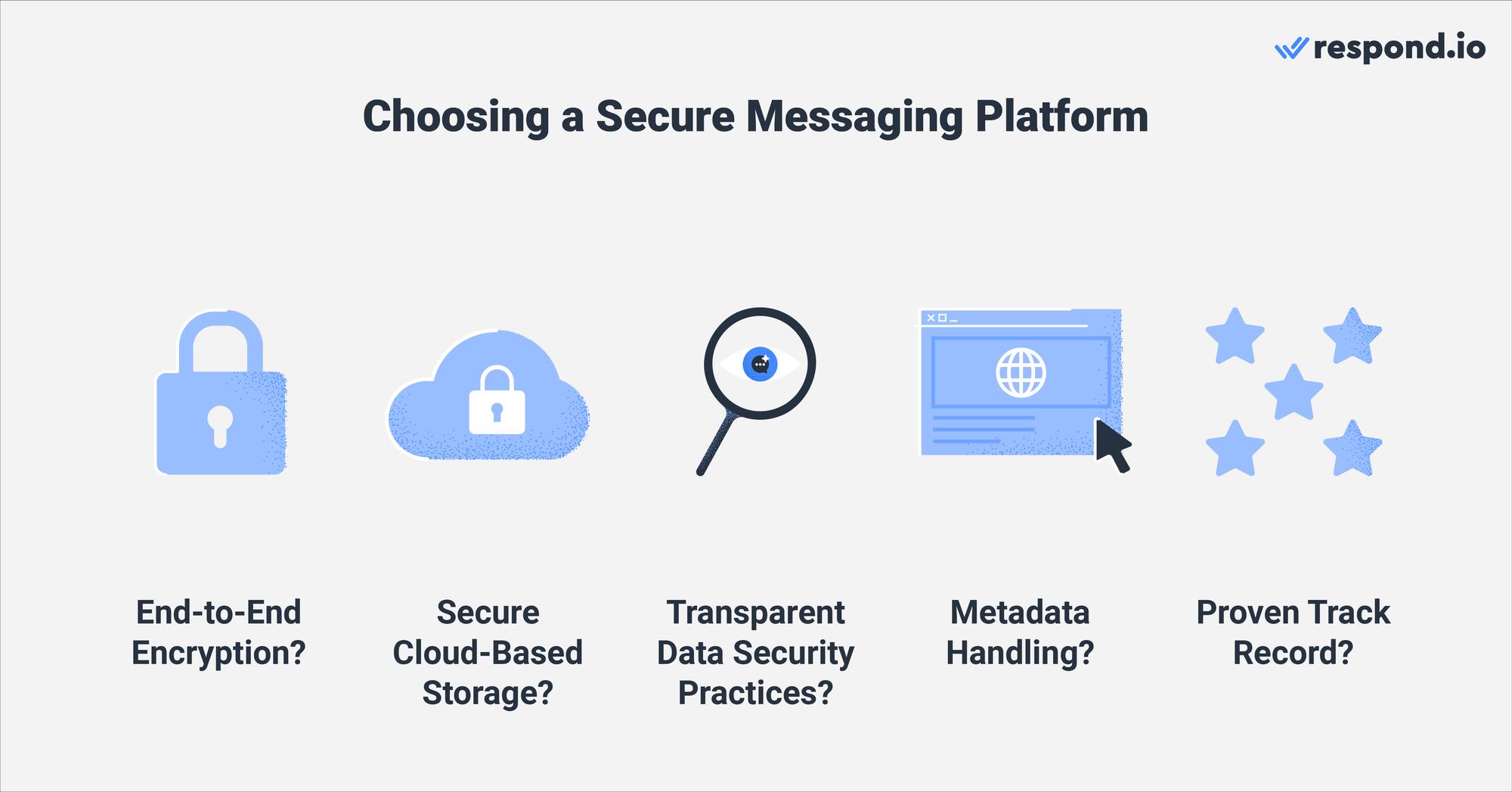
Data breaches are all too common in today’s secure messaging landscape. From Telegram and Facebook Messenger to Slack, no enterprise is safe from incidents. Even in 2023 alone, we’ve seen a staggering 8 billion data breaches and cyber-attacks.
But these statistics aren’t really about the numbers — it’s a wake-up call for businesses like yours to take data security and secure messaging seriously.
While it’s impossible to guarantee complete protection against breaches, you can minimize the risk by adopting a proactive security approach to better protect your organization and, more importantly, your customers.
What is Data Security?
At its core, data security is about protecting your digital information.
Much like keeping your valuables safe in a bank, data security keeps your data safe from both malicious (e.g., phishing) and unmalicious (e.g., human error) incidents through a variety of methods such as access control, encryption, Two-Factor Authentication and security audits.
The level of diligence your organization needs to place on data security will differ widely across sectors. For instance, consider a financial institution or hospital handling sensitive personal data. The potential consequences of a security breach are significantly higher for them, given the need to comply with specific regulations, such as HIPAA and GDPR, compared to a family-run business selling used electronics through Facebook Marketplace.
That said, regardless of your size or industry, data security must be made a priority as the credibility of your entire business hinges on it.
Secure Instant Messaging to Emails: Why Data Security Matters
Getting data security right is non-negotiable. The global average cost of a breach in 2023 was USD 4.45 million. Moreover, a study by McKinsey found that 87% of customers claimed they would not do business with a company if they had concerns over its security practices.

These two statistics mean one thing: there is no room for error as the stakes are high. Security isn’t just a nice-to-have; it’s a necessity as the consequences for getting it wrong include:
Financial Costs
Breaches aren't cheap, and the associated financial costs can make even conglomerates wince. Beyond legal and regulatory penalties, expect to spend substantial resources on incident response, compensating your customers, crisis management and developing more up-to-date security infrastructure.
Worse yet, if your organization is publicly listed, a breach will almost always impact your share price, bringing your market value down.
Legal Repercussions
Businesses have a legal obligation to take clear steps in protecting their customers' data, and regardless of whether a breach was intentional or accidental, they will bear the full brunt of penalties.
Though penalties vary greatly based on specific jurisdiction and industry, businesses can expect a combination of fines, regulatory sanctions, public notice requirements and even individual lawsuits from customers themselves.
Reputational Damage
The lifeblood of any organization lies in its customers as without them, there would be nobody to sell products and services to. A breach of security is also a breach of your customers' trust. No one wants their personal information, be it addresses or credit card details, to fall into the wrong hands.
Customers also talk. So, beyond them taking their business elsewhere, don't be surprised if they start sharing their experiences with friends and family, as well as through negative online reviews and social media posts.
Turn customer conversations into business growth with respond.io. ✨
Manage calls, chats and emails in one place!
Best Data Security Practices for Business Messaging
23 billion instant messages are sent in a day along with 361.6 billion emails, which should impress upon you the monumental task that is ensuring the security of your business messaging. This can feel daunting since your organization and solution are only as good as the security that supports them, so taking things one step at a time is advisable.

It’s impossible to ensure everything sent and received is airtight but so long as you maintain these key practices, you’ll be able to significantly streamline your security processes:
#1 Educate Your Employees and Users
The human element is often the weakest link in breaches, with both employees and customers being equally vulnerable. To mitigate this, consider implementing comprehensive and frequent training sessions on best data security and secure messaging practices.
These sessions could include workshops on security policies, phishing awareness and even preventative measures. Utilizing a mix of webinars, newsletters and interactive e-learning platforms also helps ensure your content is accessible and engaging for as broad an audience as possible.
#2 Create an Incident Response Plan
In the event of a security breach, every minute counts in controlling the damage and preventing the situation from worsening.
Incident response plans are worth their weight in gold here as they provide a clear roadmap that outlines what actions need to be done and which stakeholders should be contacted during a breach. From incident identification to recovery to addressing PR issues, these plans keep an otherwise chaotic affair systematic.
#3 Conduct Regular Audits
Businesses must always strive to achieve two objectives: continuously improve their security practices and minimize complacency. One tried-and-tested method for accomplishing this is through internal security audits, which help keep teams vigilant.
Security audits assess whether your established security standards are being upheld and identify any potential vulnerabilities and gaps that need to be addressed before they can be exploited, ultimately helping you avoid hefty costs in the future.
#4 Have a Clear Data Security Policy
Having a clear, well-defined data security policy does more than outline how you comply with laws and regulations, handle data usage and collection and define who has access. It signals to customers that you are fully committed to securing their data and are being transparent about it, ultimately strengthening your reputation as a responsible organization.
That said, a policy is only effective if it's actually being read. Remember your audience: chances are, they're not all lawyers, so avoid technical jargon and ensure your policy is written in simple language.
What to Look for in a Secure Messaging and CRM Platform
You could follow the above best practices to the tee, but if the platform you’re using is inherently vulnerable, it would be for nothing. The platform you choose to use to interact with your customers is just as important as the practices you implement.

To help you select the most secure messaging platform, ask the following questions about your choice:
Does it have end-to-end encryption?
Having end-to-end encryption is a must-have to protect your data not just from malicious entities, but from governments and even large corporations. This encryption ensures that messages are fully secured from the moment they are sent until they are successfully delivered to the intended recipient, a feature particularly important for communication.
Does it use secure cloud-based storage?
Storing data in the cloud is convenient and widespread, and though it can offer considerable data protection note that the level of security depends entirely on the provider. For instance, Microsoft Azure, Google Cloud Platform (GCP) and Amazon Web Services (AWS) are known to be some of the most reputable and safest providers.
Is it transparent about its data security practices?
A truly secure messaging platform will be transparent about its security practices. This means going beyond merely stating their procedures; they should also openly discuss how they handle breaches, the security protocols they use and their future plans for enhancing security.
How much metadata does it store?
Metadata, including locations, names, phone numbers, internet histories and more, can reveal a shockingly large amount of information when pieced together. It's crucial to understand exactly how much and what kind of data your platform stores. Consider how comfortable you are with the data being collected before choosing a secure CRM or platform.
Does it have a proven track record?
A good messaging platform is more than features advertised on a page. It should have a history of being tested, actively used and approved by actual customers. When researching a potential platform, make sure you visit review sites like G2 and Capterra to understand how secure and reliable it is.
Exploring Respond.io's Security Measures
Respond.io has always prioritized security with a meticulous and proactive approach, constantly ensuring all measures taken satisfy the demands of secure instant messaging, both now and in the future.
Let’s now take a closer look at some of the key security measures implemented over the past year:
ISO 27001:2022 Certification
The ISO 27001:2022 certification, awarded by the International Organization for Standardization (ISO), is a globally recognized standard that focuses on establishing, maintaining and continually improving a systematic data security risk management system.
Achieving ISO 27001:2022 certification is no small feat. It underscores a sophisticated, systematic approach to securing sensitive information.

In August 2023, respond.io achieved a key milestone by obtaining the ISO 27001:2022 certification, solidifying its unwavering commitment to safeguarding its customers’ data from all kinds of threats.
For current respond.io users, this certification translates to more than just peace of mind. It means greater confidence in the platform's capabilities to protect sensitive data with the most stringent security protocols and risk management frameworks, significantly reducing the potential for unauthorized data access and data breaches.
GDPR Alignment
Respond.io is fully aligned with the General Data Protection Regulation (GDPR). This means we’ve implemented the processes and safeguards required to meet the strict standards set by the GDPR to handle customer data with care and transparency.
While GDPR compliance is an ongoing effort, this shows our commitment to doing things right—protecting both your business and your customers from unnecessary risk.
Single Sign-On
In a move to improve existing security measures while enhancing the user experience, respond.io introduced the Security Assertion Markup Language (SAML) Single Sign-On (SSO) feature.
This greatly streamlines the login experience across different online services and departments within a single organization by requiring the use of a single set of credentials. But beyond convenience, SSO eliminates the need to rely on multiple passwords, cutting down on the risk of password-related breaches and delivering a more seamless yet safer experience for all users.
Two-Factor Authentication
Adding to its list of robust security measures, respond.io incorporated Two-Factor Authentication (2FA), further strengthening security by addressing the vulnerabilities of password-only protection.
The idea behind 2FA is simple yet effective. It requires users, upon inputting their password, to enter a code provided by an external authenticator app on their mobile devices. Though this may sound like a hassle, it provides another layer of defense when passwords fall into the wrong hands.
In essence, this two-step verification process reduces the likelihood of unauthorized access, bolstering user confidence in the security of their data.
Phone Number and Email Masking
Being able to conceal your phone number and email addresses is a sure way to ward off potential threats, from phishing attempts to social engineering attacks to plain old spam.
This is known as masking and is a feature recently introduced by respond.io.
But beyond the average user, masking is particularly invaluable for those who manage personal sensitive data. In today’s digital world, where data breaches are increasingly common, the ability to mask contact details is not just a convenience; it's a necessity that makes it harder for unauthorized entities to exploit your users.
Are you in the market for a leading customer conversation management software that takes security as seriously as its functionalities? Sign up for a free respond.io account to experience how our advanced security measures seamlessly integrate with our suite of features.
Turn customer conversations into business growth with respond.io. ✨
Manage calls, chats and emails in one place!
Further Reading
If you found our insights on data security interesting, we invite you to check out the following:






































 Electronics
Electronics Fashion & Apparel
Fashion & Apparel Furniture
Furniture Jewelry and Watches
Jewelry and Watches
 Afterschool Activities
Afterschool Activities Sport & Fitness
Sport & Fitness
 Beauty Center
Beauty Center Dental Clinic
Dental Clinic Medical Clinic
Medical Clinic
 Home Cleaning & Maid Services
Home Cleaning & Maid Services Photography & Videography
Photography & Videography
 Car Dealership
Car Dealership
 Travel Agency & Tour Operator
Travel Agency & Tour Operator




